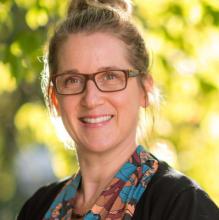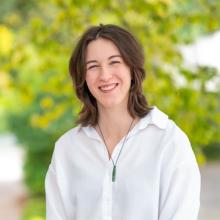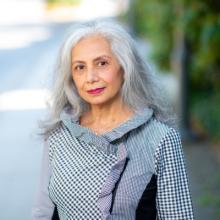Being a public scholar means engaging with the wider world to make sure that academic research is useful for the communities it involves and is shared beyond academic journals and publications. It also means collaboration with other scholars and community members, thinking beyond an individual-focused view of knowledge creation and working together to mobilize research into action.
Research Description
My research is focused at the intersection of extreme heat, housing justice and aging in Metro Vancouver. In the wake of the deadly 2021 heat dome in British Columbia, I am focused on understanding heat vulnerability, especially for older adults in Metro Vancouver. Temperature is often used to mark experiences of heat, but heat vulnerability is an embodied, socially-produced experience, amid housing, social relations and underlying health conditions, which requires both numerical and lived experience narratives in order to be fully understood. My research employs visual, oral and archival participatory methods to document and share older adults' experiences of extreme heat. I’m asking: how is heat experienced, remembered and documented in the unequal urban context of Vancouver, and how are individual and collective memories and stories about heat mobilized in policy practice, community organizing and seniors’ social networks and individual practices? My PSI project, a collaborative project with fellow PSI scholar Katherine White, combines diaries, oral histories and sensor data from a group of older adults in South Vancouver to create a fuller picture of their experiences at home and in their neighborhood during heat events. We explore how different quantitative and qualitative methodologies can work together to tell stories about how different bodies, homes and neighborhoods experience extreme heat. We will also further engage community members in South Vancouver in workshops around their daily routines and frequented cool spaces during summer months in order to provide further information about cool space planning in South Vancouver.
What does being a Public Scholar mean to you?
Being a public scholar means engaging with the wider world to make sure that academic research is useful for the communities it involves and is shared beyond academic journals and publications. It also means collaboration with other scholars and community members, thinking beyond an individual-focused view of knowledge creation and working together to mobilize research into action. Extreme heat is an inherently public issue and one that is experienced in place and in the context of people’s lives. Therefore, for me, being a Public Scholar means understanding and reckoning with the complexities of how heat is experienced, remembered and narrated.
In what ways do you think the PhD experience can be re-imagined with the Public Scholars Initiative?
The Public Scholars Initiative gives value and recognition to presenting work in non-academic, accessible settings. As graduate work often revolves around publishing and presenting in academic environments, having a chance to explore other ways of presenting work to non-academic partners and the public allows for a much more grounded and reflexive view of what research is and who it should be for. The PSI also provides opportunities for collaboration across disciplines, departments and partners, which is not always easily possible at a PhD level. This allows for important experience in collaboration across expertise and disciplines, which is very valuable for both future academic and non-academic work.
How do you envision connecting your PhD work with broader career possibilities?
I am hoping to be involved with research and knowledge production around climate and housing issues in both academia and in community-engaged heat planning work. I hope to engage different storytelling methods around heat in order to make sure that the lived experience of vulnerable people affected by climate change are reflected in decision-making. Working with different community and governmental partners during the PhD will also give me experience in translating information between the spheres of academia, policy-making and community-organizing.
How does your research engage with the larger community and social partners?
Heat is an inherently public issue. I’ve been working with the South Vancouver Seniors Network for my graduate work for a couple of years, gathering stories of older adults’ experiences of extreme weather and understanding how these experiences intersect with housing, economic difficulties and social networks. Our PSI project partners with the South Vancouver Seniors Network, Vancouver Coastal Health and the City of Vancouver to ensure that our questions, findings and recommendations feed into and from community and government-level response to heat. We also engage with community members' expertise about their own bodies, homes and neighborhoods through our work with diaries, life histories and community workshops.
Why did you decide to pursue a graduate degree?
I came to UBC for my MA in Geography in 2021 after working in human rights and environmental conflict fields for a few years. I was hoping to further explore the relationship between memory, testimony and environmental justice, a gap I saw from my work in these fields. For me, doing graduate work meant having the opportunity to dive into the slippery topic of memory and documentation of environmental injustice and disaster and explore how it matters for policy and community level interventions around environmental justice and climate change. When I arrived in Vancouver, I became involved with UBC Centre for Climate Justice’s Housing Justice in a Climate Emergency project, and this work reoriented the focus of my graduate work onto extreme heat in British Columbia, especially focusing on the impacts of the 2021 heat dome.
Why did you choose to come to British Columbia and study at UBC?
I applied to graduate school in the fall of 2020 during the height of the COVID-19 pandemic. One of the places I applied was UBC Geography, as I was excited by the work on social-environmental relationships there. I was drawn to the community-engaged work at UBC and the work of my advisors, Dr. Rafi Arefin and Dr. Leila Harris, in urban and feminist political ecology and socio-cultural geography. It felt like a long shot at the time, but luckily it worked out and I moved from New York to Vancouver in 2021, with the landscape of the Pacific Northwest a welcome change from COVID-era New York City. I decided to stay at UBC for my PhD as I have really grown to feel part of a community here, both at UBC and in Vancouver more broadly.





